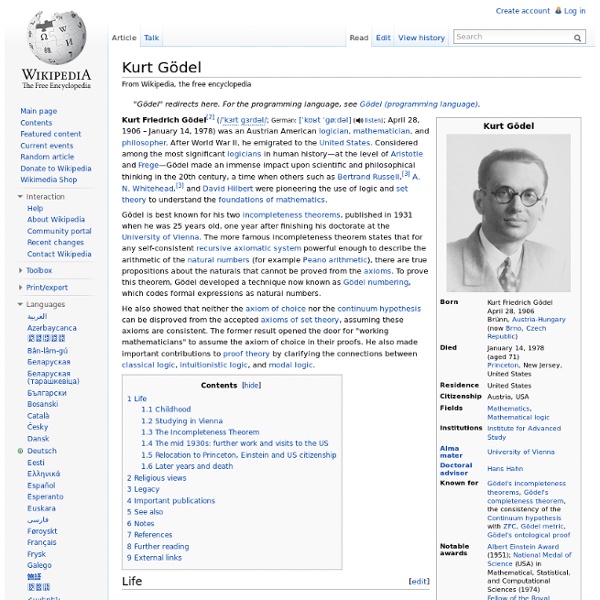Bertrand Russell
Russell led the British "revolt against idealism" in the early 20th century.[58] He is considered one of the founders of analytic philosophy along with his predecessor Gottlob Frege, colleague G. E. Moore, and his protégé Ludwig Wittgenstein. He is widely held to be one of the 20th century's premier logicians.[55] With A. Russell was a prominent anti-war activist; he championed anti-imperialism[60][61] and went to prison for his pacifism during World War I.[62] Later, he campaigned against Adolf Hitler, then criticised Stalinist totalitarianism, attacked the involvement of the United States in the Vietnam War, and was an outspoken proponent of nuclear disarmament.[63] In 1950 Russell was awarded the Nobel Prize in Literature "in recognition of his varied and significant writings in which he champions humanitarian ideals and freedom of thought Biography Early life and background Young Bertrand Russell Childhood and adolescence University and first marriage Early career Russell in 1907.
FIBONACCI
"...considering both the originality and power of his methods, and the importance of his results, we are abundantly justified in ranking Leonardo of Pisa as the greatest genius in the field of number theory who appeared between the time of Diophantus [4th century A.D.] and that of Fermat" [17th century] R.B. McClenon [13]. [Numbers in square brackets refer to REFERENCES at the end of this article.] 1. During the twelfth and thirteenth centuries, many far-reaching changes in the social, political and intellectual lives of people and nations were taking place. By the end of the twelfth century, the struggle between the Papacy and the Holy Roman Empire had left many Italian cities independent republics. Among these important and remarkable republics was the small but powerful walled city-state of Pisa which played a major role in the commercial revolution which was transforming Europe. Pisa today is best known for its leaning tower (inclined at an angle of about 161/2o to the vertical).
Rudolf Carnap
Rudolf Carnap (May 18, 1891 – September 14, 1970) was a German-born philosopher who was active in Europe before 1935 and in the United States thereafter. He was a major member of the Vienna Circle and an advocate of logical positivism. Life and work[edit] Carnap's Birthplace in Wuppertal Carnap's father had risen from the status of a poor ribbon-weaver to become the owner of a ribbon-making factory. In 1928, Carnap published two important books: The Logical Structure of the World (German: "Der logische Aufbau der Welt"), in which he developed a rigorous formal version of empiricism, defining all scientific terms in phenomenalistic terms. In February 1930 Tarski lectured in Vienna, and during November 1930 Carnap visited Warsaw. Carnap, whose socialist and pacifist beliefs put him at risk in Nazi Germany, emigrated to the United States in 1935 and became a naturalized citizen in 1941. Carnap taught himself Esperanto when he was 14 years of age, and remained sympathetic to it (Carnap 1963).
Eliminative materialism
Eliminativists argue that modern belief in the existence of mental phenomena is analogous to the ancient belief in obsolete theories such as the geocentric model of the universe. Eliminativism stands in opposition to reductive materialism, which argues that a mental state is well defined, and that further research will result in a more detailed, but not different understanding.[3] An intermediate position is revisionary materialism, which will often argue that the mental state in question will prove to be somewhat reducible to physical phenomena - with some changes to the common sense concept. Eliminativism about a class of entities is the view that that class of entities does not exist.[4] For example, all forms of materialism are eliminativist about the soul; modern chemists are eliminativist about phlogiston; and modern physicists are eliminativist about the existence of luminiferous aether. Overview[edit] Philosophers who argue against eliminativism may take several approaches.
Paul Churchland
Paul Churchland (born October 21, 1942) is a Canadian philosopher noted for his studies in neurophilosophy and the philosophy of mind.[1] He is Professor Emeritus at the University of California, San Diego, where he held the Valtz Chair of Philosophy[2] and a joint appointment with the Cognitive Science Faculty and the Institute for Neural Computation.[3] He earned his Ph.D. from the University of Pittsburgh in 1969 under the direction of Wilfrid Sellars.[4] Churchland is the husband of philosopher Patricia Churchland. He is also the father of two children, Mark and Anne Churchland, both of whom are neuroscientists.[5][6][7] Professional career[edit] Philosophical views[edit] Just as modern science has discarded such notions as legends or witchcraft, Churchland holds the belief that a future, fully matured neuroscience is likely to have no need for "beliefs" (see propositional attitudes). Works[edit] Books[edit] Essays[edit] See also[edit] References[edit] External links[edit]
Daniel Dennett
Daniel Clement Dennett III (born March 28, 1942)[1][2] is an American philosopher, writer, and cognitive scientist whose research centers on the philosophy of mind, philosophy of science and philosophy of biology, particularly as those fields relate to evolutionary biology and cognitive science.[3] Early life and education[edit] Dennett was born on March 28, 1942 in Boston, Massachusetts, the son of Ruth Marjorie (née Leck) and Daniel Clement Dennett, Jr.[6][7] Dennett spent part of his childhood in Lebanon, where, during World War II, his father was a covert counter-intelligence agent with the Office of Strategic Services posing as a cultural attaché to the American Embassy in Beirut.[8] When he was five, his mother took him back to Massachusetts after his father died in an unexplained plane crash.[9] Dennett says that he was first introduced to the notion of philosophy while attending summer camp at age 11, when a camp counselor said to him, "You know what you are, Daniel? First ...



